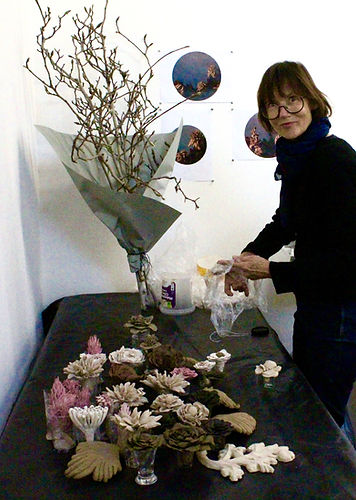
ARTIST STATEMENT
Originally trained in sculpture and drawing, Wendy Miller is a multidisciplinary artist currently creating on Gadigal land Sydney. Unconfined by constraints of a single medium, her work explores contemporary themes of value, ruin, and ecological disorder resulting from European empires and their institutional structures. Past works have explored themes of capitalism through Dutch flower paintings and the role her colonial ancestors may have played in the frontier wars that resulted in the near genocide of Tasmanian Aboriginals. In addressing these colonial histories Miller highlight the continuing global impact on contemporary society.
Foregrounding the devastation of South Eastern Australia’s kelp forests, Millers 2024 Solo Exhibition Avarice offers insights into humanity’s influence on the environment by connecting the current ecological crisis to the legacies of empire-building, Christianity and colonisation.
Millers 2022 Masters of Fine Art thesis , From a disappearing world: drawing from the devastation wreaked on the unseen natural environment by imperial and colonial practices, offers a critical visual perspective on humanity's impact on the planet by linking today's ecological crisis with the legacies of empire building and colonisation. In particular, Miller focuses on the devastation of the kelp forests in South Eastern Australia. The project locates the origin of this devastation in the global impact of empire building and colonisation, exploring how and why it came about and the consequent impact on the natural world. Humans have not contributed equally to climate change and her practice highlights this unequal contribution by referencing those in power during the greatest periods of empire building and also visualising contemporary themes of value and preciousness. The artwork is contextualised by research on climate change scholarship, nature-culture dualism and the European imperial and colonial practices of exploitation of natural resources, plantation agriculture, genocide and the forced migration of people through slavery and incarceration. These practices have and continue to reshape lives and the natural world on a global scale.
Key words: Anthropocene, climate change, colonisation, Christianity, ecology, ecocide, empire, environmental aesthetics, European monarchy, expanded drawing,
kelp, loss, nature-culture dualism, organic materials.
